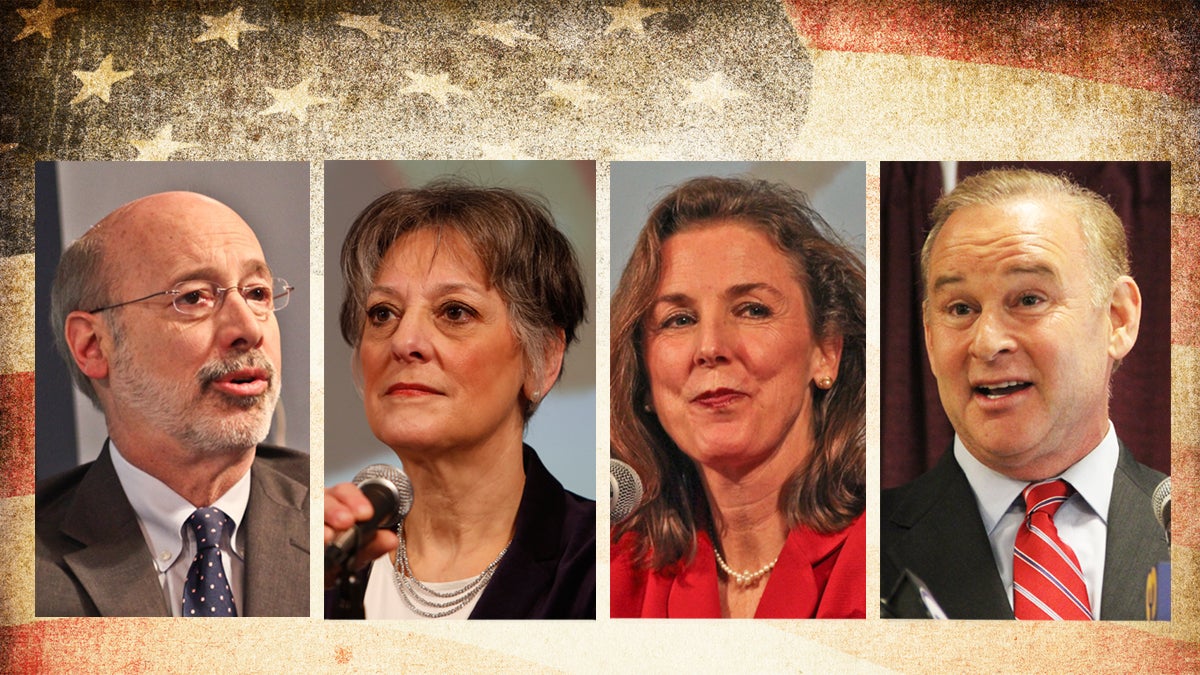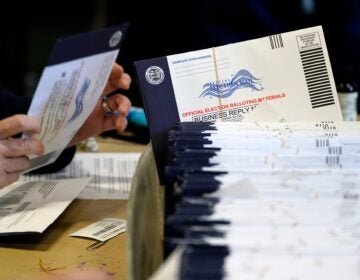How the candidates stack up on education
Listen
Pennsylvania's gubernatorial candidates (from left) York businessman Tom Wolf, U.S. Rep. Allyson Schwartz, former Department of Environmental Protection Secretary Katie McGinty, and state Treasurer Rob McCord (NewsWorks Image)
Polls are showing that education is the hands-down most important issue for voters heading to the polls later this month.
The gubernatorial candidates — state Treasurer Rob McCord, former Department of Environmental Protection Secretary Katie McGinty, U.S. Rep. Allyson Schwartz, and York businessman Tom Wolf — agree on most education-related issues.
All four want to increase early childhood education programs, enact tougher reforms on the charter school sector, and re-evaluate the formula for distributing state aid. They also have specific proposals that set them apart from one another.
Click on the audio player to hear WHYY’s Dave Davies discuss the candidates’ educaiton platforms with Kevin McCorry
“On announcement day, I didn’t talk about 20 issues. It was all about education, education, education,” said McCord, who would earmark an additional $220 million a year for early-childhood learning.
Wolf is calling for a moratorium on new cyber-charters and says he’d specifically create an office for greater charter school oversight.
“What we have to be against is charter schools that are unaccountable,” said Wolf, “and charter schools that are being funded to the extent of this $300 million to $400 million of excess that’s leaking out of our public school system.”
McGinty would limit class size to 25 students.
But with four distinct yet ambitious education agendas in contention, the candidates have rallied around a tax on Marcellus Shale natural gas drilling to pay for their ideas.
McCord wants a 10 percent tax, the largest of all the candidates, and says he’d use $1.3 billion out of an estimated $1.6 billion in revenue for education. Schwartz and Wolf both want a 5 percent tax.
McGinty stands out here. Although her planned tax of 4.5 percent on drillers isn’t the largest, she’d send all of the proceeds to schools.
“We have to do that,” she said. “We can’t squander the Republican and Democratic bipartisan support I know we can generate to win those dollars if on Monday it’s for education, but Tuesday it’s for infrastructure.”
A tax on fracking, which Gov. Tom Corbett has stayed away from, would also help replenish what the candidates say was a billion-dollar cut to the education budget under Corbett. But the governor says the state’s funding for education has never been higher.
So who’s right?
“Corbett’s math counts dollars budgeted for things like the teacher pension system,” said WHYY’s education reporter Kevin McCorry. “The Democratic candidates, though, point to the decline of actual dollars spent in classrooms, which, yes, between Gov. Rendell’s last year and Corbett’s first year dropped by a billion dollars.”
But as much as education is a numbers game in Pennsylvania, the candidates have also been invoking their personal narratives throughout the campaign.
Wolf says that his two daughters thrived in York County’s second-poorest school district, thanks to hard-working teachers and staff. McCord, who earned the endorsement of PSEA, the state’s largest teachers union, received much of his education in the Lower Merion School District. McGinty, a graduate of St. Hubert’s in Northeast Philadelphia, positions herself as a political outsider from humble roots.
Schwartz, whose mother and two sons also attended school in Philadelphia, touts her political background as proof that she’d be able to follow through on her promises. “What sets me apart is my experience and leadership and having gotten things done on education,” Schwartz said. “It’s not just a policy for me. This is work that I’ve done.”
WHYY is your source for fact-based, in-depth journalism and information. As a nonprofit organization, we rely on financial support from readers like you. Please give today.





